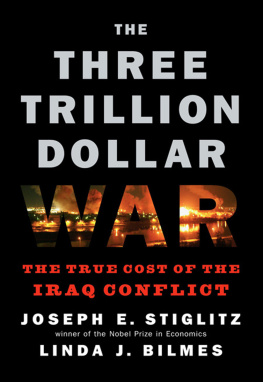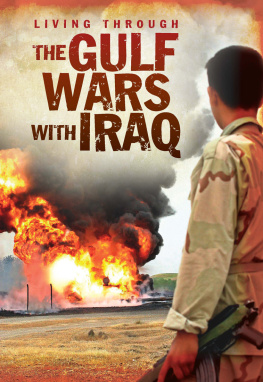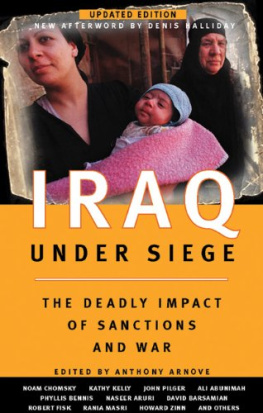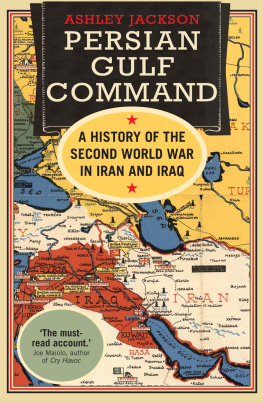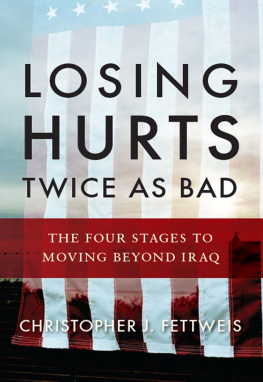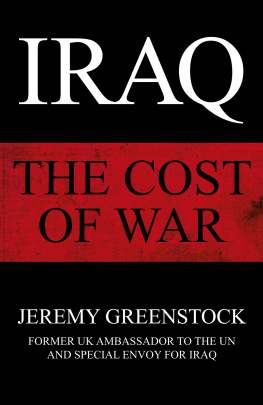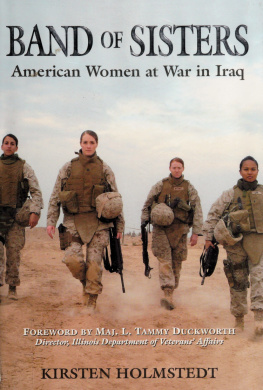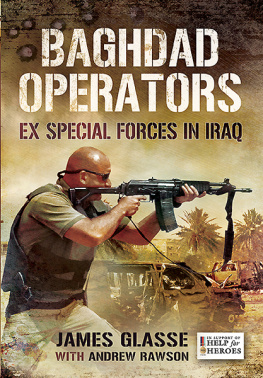Joseph E. Stiglitz
Linda J. Bilmes
Copyright 2008 by Joseph E. Stiglitz and Linda J. Bilmes
For information about permission to reproduce selections from this book, write to Permissions, W. W. Norton & Company, Inc., 500 Fifth Avenue, New York, NY 10110
W. W. Norton & Company, Inc.
500 Fifth Avenue, New York, N.Y. 10110
www.wwnorton.com
W. W. Norton & Company Ltd.
Castle House, 75/76 Wells Street, London W1T 3QT
Afghanistan as well as to those still placing their lives at risk.
especially those who have become disabled.
they deserve all the care we can give.
Preface
BY NOW IT is clear that the U.S. invasion of Iraq was a terrible mistake. Nearly 4,000 U.S. troops have been killed, and more than 58,000 have been wounded, injured, or fallen seriously ill. A further 7,300 troops have been wounded or injured or fallen seriously ill in Afghanistan. Sectarian violence is rife. Iraqs chaos has made the country a magnet for terrorists of all stripes. The notion that invading Iraq would bring democracy and catalyze change in the Middle East now seems like a fantasy. When the full price of the war has been paid, trillions of dollars will have been added to our national debt. Invading Iraq has also driven up oil prices. In these and other ways, the war has weakened our economy.
Given the human suffering the war in Iraq has caused, it may seem callous to even think about the financial cost. Dry numbers will never capture the pain of those killed or maimed and scarred for life. But we believe that understanding the cost of war is essential.
The decision to go to war was based on a number of false premises. One asserted a link between Saddam Hussein and the terrible attacks of 9/11 on the World Trade Center and the Pentagon. Faulty intelligence led to claims that Iraq had weapons of mass destruction even though the inspectors of the International Atomic Energy Agency (IAEA) said there were none. Many argued that the war would be over quickly and that democracy would somehow bloom in Iraq. And, finally, there was the notion that the war would cost little and pay for itself.
In fact, the war has turned out to be hugely costly in both blood and treasure. We estimate that the total budgetary and economic cost to the United States will turn out to be around $3 trillion, with the cost to the rest of the world perhaps doubling that number again. In one sense, this book is about that $3 trillionhow America will be paying the bill for this war for decades to come, and why it is that the true costs are so much larger than the cost estimates originally provided by the Bush administration. But the book is also about much more than a single number. By examining the costs, we come to understand better the implications of the war, and perhaps learn how we can extricate ourselves from Iraq with the least amount of damage.
AMERICA HAS ALREADY paid a steep price for invading Iraq. The most visible burden is the toll on our fighting men and women. The economic burden is less readily apparent. Current expenditures, largely financed by borrowing, have been grossly underestimated, although even the vast sums we have spent have not been sufficient to achieve our objectives or protect our troops. Future costs, which will continue to escalate after we finally leave Iraq, have been deliberately glossed over.
These costs are certain to be huge and will continue for generations. That is the lesson of the 1991 Gulf War, a conflict that lasted for less than two months, with little ground fighting and 694,550 troops deployed to the Gulf. One hundred forty-eight U.S. soldiers were killed, and 467 injured in direct combat.
To arrive at the $3 trillion figure, we had to look beyond the governments bad budgeting and misleading accounting. It may sound strange to say it, but going to war is a big business. No modern firm would attempt to run its business without timely, accurate information provided by good accounting systems. Yet the accounting practices used by the government are so shoddy that they would land any public firm before the Securities and Exchange Commission for engaging in deceptive practices.
Just as bad accounting in the private sector misleads investors, so bad accounting in the government misleads ordinary citizens and contributes to major mistakes in the allocation of resources. When Army Spc. Thomas Wilson of the 278th Regimental Combat Team (a Tennessee National Guard unit then stationed in Kuwait) famously asked Defense Secretary Donald Rumsfeld, Why do we soldiers have to dig through local landfills for pieces of scrap metal and compromised ballistic glass to up armor our vehicles? Rumsfeld replied, You go to war with the Army you have, not the Army you might want or wish to have at a later time.
Five years later, the United States is engaged in a national debate about how to exit the war. Few voices have openly supported the notion of a permanent occupation. The question appears to be not whether we leave, but when. This issuewhich economists refer to as intertemporal decision making is one which modern decision theories have a great deal to contribute. Although President George W. Bush has dismissed our earlier cost-of-war analysis, arguing that military policy would not be determined by accountants in green eyeshades, making informed choices about real-world options should clearly include cost as one of the factors to be taken into account. Our resources are not infinite. We must face the reality not only of how much we have already spent and committed to date, but also the implications of future choices. Decisions are always made with imperfect information, but modern economic techniques can help clarify the available information and enable us to make better decisions in these adverse circumstances.
Whether one thinks it was right or wrong to have gone to war, whether one thinks the war was conducted poorly or well, most Americans agree that it is our moral duty to provide adequate health care and disability payments for those who risk their lives for their country. Doing so will be costly, and the government must provide adequate funds.
Thus far, the administration has failed to plan adequately for returning Iraq war veterans and the scale of their injuries. There is insufficient funding for veterans hospitals, a shortage of medical care in many citiesand long, tortuous delays in processing disability claims. Many of these claims are mishandled and our soldiers have to file appeals and fight yet another war when they come homethis time with the bureaucracy. In 2005, even as the war was in full swing, the Department of Veterans Affairs (VA) budget request for veterans medical care was still based on projections done before the war had begun. In 2006, as the insurgency expanded, the VAs budget request was based on data from 2003. Not surprisingly, the VA ran out of moneyforcing Congress to appropriate $3 billion in emergency funds just to keep the programs running for those two years. In 2007, the president again asked for billions more in emergency supplemental funding so that military and veterans hospitals would be able to handle the surge of returning troops with injuries.

